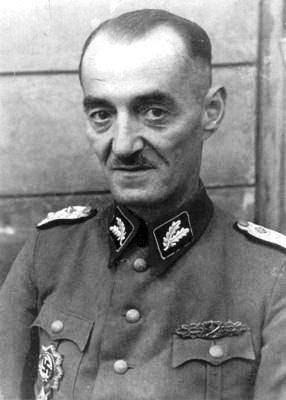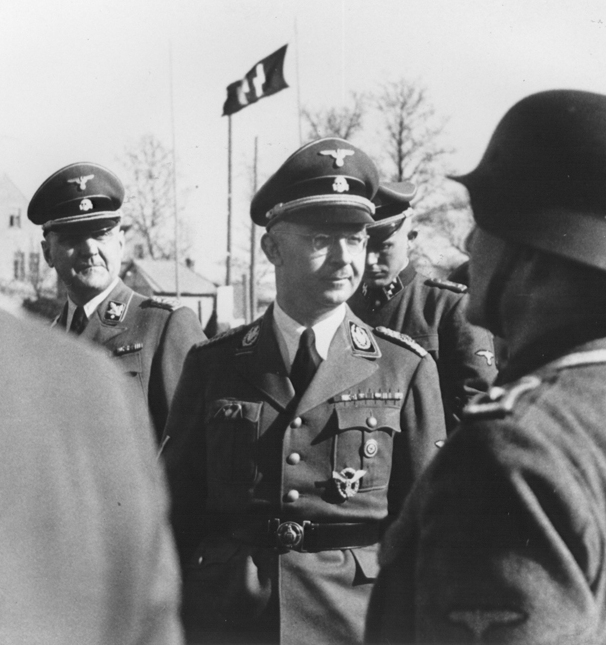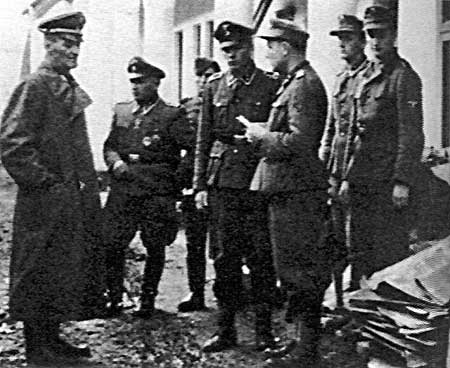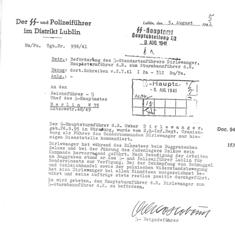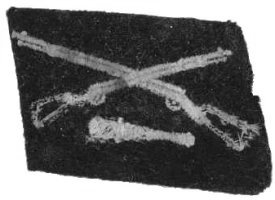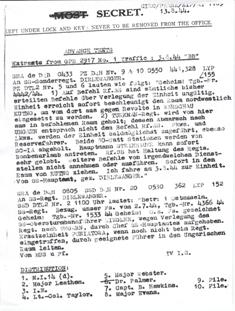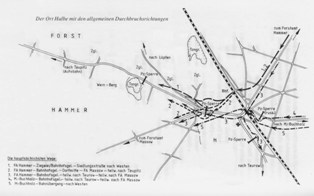Holocaust Education & Archive Research Team |
|
Einsatzgrϋppen
Einsatz Group A Einsatz Group B Einsatz Group C Einsatz Group D Babi Yar Articles Einsatz Leaders Einsatzgruppen Operational Situational Reports [ OSR's #8 - #195 ]
| ||||
Oskar Dirlewanger Sonderkommando Dirlewanger
Oskar Dirlewanger was born in Wurzburg on 26 September 1895. During World War One, he reached the rank of lieutenant and won the Iron Cross. Between 1919 and 1921 he was involved in the suppression of communist risings in the Ruhr and Saxony, also serving in the Freikorps in Upper Silesia.
In 1922 he obtained a degree in political science and a year later joined the Nazi Party, and ran a knit-wear factory in Erfurt for a few years before becoming an SA leader in Esslingen in 1932. After serving a two-year sentence in 1934 for molesting a minor, Dirlewanger joined the Condor Legion in 1937, fighting for Franco in the Spanish Civil War.
In July of 1939 Oskar Dirlewanger sent a letter to Himmler requesting admission to the Waffen-SS but was initially denied entrance due to a criminal conviction for “immoral activity with an underage girl. He was sentenced to two years imprisonment and was released in October of 1936.
The Reichs-fuhrer-SS has been presented with your letter of July 4, 1939. He is hereby informing you that he cannot grant your wish to march with the SS in the case of mobilization because your results of the court proceedings for your rehabilitation, as you requested must be resolved. However, the Reichs-fuhrer-SS is of the opinion that, in view of your having been a former member of the Condor Legion, you would be allowed to volunteer in any department of the Wehrmacht in the case of serious developments.
During 1940 another action was ongoing concerning the possible formation of a special new unit. SS-Gruppenfuhrer Karl Wolff placed a telephone call to the Reich's Minister of Justice. Wolff stated that it was Hitler’s wish to grant amnesty for selected poachers for the purpose of sending them to the front.
The Fuhrer wanted only those poachers who had hunted illegally with firearms and not those who had used traps or snares. In addition Hitler was only interested in poachers from Bavaria or Austria as opposed to other areas of the Reich.
The poachers would be organized into a special “Sharpshooter” company and would fall under the governance of the SS. Meanwhile Dirlewanger successfully overturned his conviction from 1934 and in Saturday, May 25, 1940 he was fully exonerated.
September 1940, at the suggestion of Gottlob Berger (Head of the SS –Recruitment Department) Dirlewanger now an SS-Hauptsturmfuhrer, was made commander of the special SS detachment of convicted criminals, murderers and convicted poachers.
The SS-Sonderkommando Dirlewanger was born.
This SS-Sonderkommando Dirlewanger provoked revulsion in some SS circles, by its cruelty and murderous havoc it created in combating partisans and Jews in Poland and White Russia.
However despite the protestations of some in the SS, Dirlewanger was endorsed by SS-Obergruppenfuhrer Freidrich Kruger for advancement and on November 9, 1941 he was promoted to SS-Sturmbannfuhrer.
Dirlewanger served for a time in the Lublin district supervising the building defence fortifications along the Bug River at Belzec and the Jewish camp at Dzikow, and SSPF for the Lublin district and was again recommended him for promotion this time by Odilo Globocnik on the 5 August 1941.
However the favour of Kruger and Globocnik was not to last and Dirlewanger was soon plagued by investigations concerning his activities regarding the mistreatment of Polish civilians and was also accused of engaging in sexual activity with female Jews (prior to murdering them).
An investigation into its activities was launched in August 1942 and its findings submitted to an SS court, but on Himmler’s orders no action was taken against Direlwanger.
In February, 1942, it was reassigned for anti-partisan duties in Belorussia. Dirlewanger was known to lead his soldiers into combat personally which was unusual for someone of his rank; he was wounded many times in combat. Dirlewanger received the clasp to his Iron Cross II on May 24, 1942, and that to his Iron Cross I on September 16, 1942 and received the German Cross in Gold on December 5, 1943 in recognition of his regiment's successes during this time.
His unit was also active in the suppression of the Polish uprising in Warsaw which commenced in August 1944. By the 5 August Dirlewanger had sixteen officers and 865 men in Warsaw. While the fighting was in progress the unit received 2,500 troops of which 1,900 came from the SS Prison Camp at Matzkau near Danzig. At the end of the uprising Dirlewanger had only 648 men left.
On 5 August Dirlewanger’s SS barbarians advanced about 1,000 yards – in every single street in the Wola district of Warsaw. In every single street in Wola recaptured by the Germans, far behind the frontline, the inhabitants were ordered to leave their homes, induced by promises of evacuation.
As soon as large groups of civilians assembled on the streets, they were not taken to evacuation points but were herded together in cemeteries, gardens, back yards, factory forecourts or squares, soldiers then fired machine gun bursts into the human mass until there were no further signs of movement.
On the 5 August no one was spared – everyone perished innocents, old men, women and children, as well as members of the Polish AK - the soldiers piled the corpses in large heaps, poured petrol over them and set them on fire.
Hospitals in the Wola and Ochota areas suffered worst of all that day. The “good fellows” as Himmler called them, with Dirlewanger at their head, stormed into the wards, shot the sick and wounded where they lay. Nurses, nuns, helpers and doctors suffered the same fate.
After Warsaw the Sonderkommando Dirlewanger saw further action in the Slovak national uprising in October 1944 where it again acted with its customary brutality.
Dirlewanger received his final promotion, to SS-Oberfuehrer der Reserve, on August 15th 1944 and for his actions in the Warsaw uprising he was awarded the Knights Cross on September 30, 1944.
In May 1945 Dirlewanger’s men were taken into Soviet captivity but he fled westwards and was arrested in Altshausen. Dirlewanger died on 7 June 1945, killed either by soldiers or former concentration camp inmates, the exact details are unknown.
Rumours surfaced years later to suggest that he had escaped, including one story of Dirlewanger serving in the French Foreign Legion, and later defecting to Egypt to accept a commission in Gamal Abdel Nasser's army.
These were proven false when a French court arranged the exhumation of his corpse to confirm his identity in November 1960.
Sources:
Who’s Who in Nazi Germany by Robert S Wistrich, published by Routledge, London and New York 1995 The Cruel Hunters French Maclean Schiffer Publishing LTD 1998. Warsaw Rising by Gunther Deschner, published by Pan Ballantine, London 1972 PRO
Copyright: Mats Olson, Chris Webb, & Carmelo Lisciotto H.E.A.R.T 2007
|
